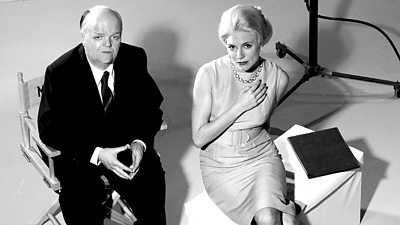The Girl: Toby Jones on playing Alfred Hitchcock
Interview with Toby Jones who plays Alfred Hitchcock in new 91�ȱ� Two drama, The Girl.

What initially attracted you to taking on the role of Alfred Hitchcock?
Even before I read the script I knew this would be a hard role to refuse. Hitchcock presented such a consistent and celebrated image to the world and yet his films, his childhood and his evident obsessions contradict the coherence of that image. Any script about Hitchcock and his personal relationships would need to address these contradictions. Here the exciting and daunting challenge was to find some light in the darkness of his obsession with Tippi.
How does Hitchcock and Tippi’s relationship develop throughout the course of the film?
The film is really about the shifts in the relationship between Tippi and Hitchcock. It deals with how that relationship changes, how the power within the relationship changes. In some ways it’s a deteriorating relationship - but it’s not quite that simple, and Tippi, I think remained forever grateful of Hitchcock, even after some of the less positive events that occurred between them. I think it was a stormy relationship.
Tippi was an unknown actress before she met Hitchcock. What do you think he saw in her?
I think that he recognized certain qualities in Tippi that he was used to working with. She was a blonde actress and she had a certain sophistication about her which was common to a lot of actresses he chose. I think the film is an exploration about the limits of those that control and to what extent he wasn’t able to manipulate her. And I think he became more and more intrigued with that part of her that he wasn't able to control.
What is the relationship like between Hitchcock and his wife Alma?
Well, as you might imagine, Hitchcock’s relationship with his wife, Alma, played by Imelda Staunton, is complicated by the complexities of his professional relationship with Tippi. And this triangle is the triangle through which the film operates. This relationship with his wife was a long, long relationship that lasted all his adult life. It started when he worked with her when she was an editor - she had a lot of expertise in cinema and he relied on her opinion and second opinion on a lot of the writing of the projects, the screenplays. Both of them would work with screenwriters to refine screenplays. And in this sense, she had a lot of authority over him.
I think in our story, there’s a huge amount of respect there. A huge amount of duty there and there’s a deep friendship and trust between them, which is complicated by his relationship with Tippi.
How do you approach playing such a public figure?
I've played several well-known public figures and I have refined a process of sorts. Of course the primary preparation is of the script itself, trying to make sense of the dramatic structure of the screenplay: to discover its dynamics, highs and lows. Character is revealed through choice so a key part of the process is uncovering the choices the character makes in the story. This is true of fictional or non-fictional characters.
I work with a terrific voice coach, Penny Dyer, and we explored Hitchcock's voice in two ways. The first is the physical, what is happening in his mouth, throat and how that resonates through his body. Then secondly, psychologically, speculating on how and why his voice evolved in that way.
Then there's a lot of secondary research, reading and watching. Thankfully Hitchcock was no shrinking violet so there’s a lot of footage of him walking, talking, turning, sitting etc. There are numerous biographies to read. The truth is though that much of this secondary research is just a way of staving off the panic of playing someone well known.
Hitchcock is such an iconic character in terms of his appearance and profile, did the costumes, make-up and prosthetics help you to get into character?
The physical transformation was more extensive than anything I've experienced before. Again Hitchcock's 'image', his public face was linked to his physical shape, his famous silhouette. There was no way round this. We could deal quite quickly with hair (or lack of it) and finding a practicable fat suit. I had a lip 'plumper' fitted by a dentist. This transparent 'brace' sat over my teeth helping to push out the bottom lip. The prosthetics were much more complicated.
The challenge with prosthetics is to find the right balance between suggestion and imitation. So much depends on the kind of piece or pieces being applied. The application took a good 3-4 hours every day. Even then the extreme heat of a Cape Town summer meant that the pieces had to be carefully monitored all day as my skin heated up below them. Clinton, the artist, kept a close watch on the state of the colour as the light and temperature varied over the days shoot.